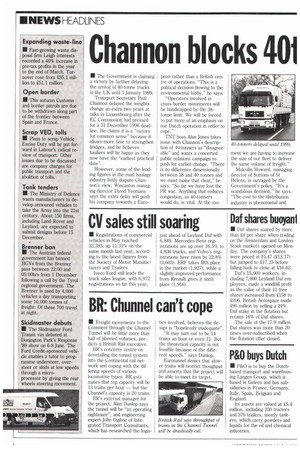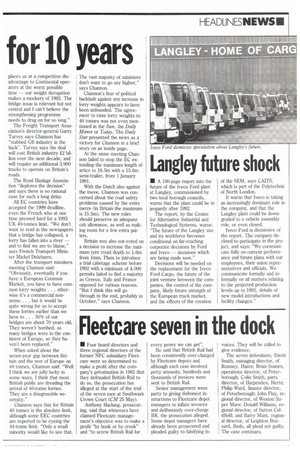Channon blocks 401 for 10 years
Page 6

Page 7

If you've noticed an error in this article please click here to report it so we can fix it.
• The Government is claiming a victory by further delaying the arrival of 40-tonne trucks in the UK until 1 January 1999.
Transport Secretary Paul Channon delayed the weights change an extra two years at talks in Luxembourg after the EC Commission had pressed for a 31 December 1996 deadline. He claims it is a "victory for common sense" because it allows more time to strengthen bridges, and he believes hauliers will be happy as they now have the "earliest practical date".
However, some of the leading figures in the road haulage industry hotly dispute Channon's view. Wincanton managing director David Yeomans says the extra delay will push his company towards a Euro pean rather than a British centre of operations. 'This is a political decision bowing to the environmental lobby," he says.
"Operators involved in cross-border movements will be handicapped by the 38tonne limit. We will be forced to put more of an emphasis on our Dutch operation in order to cope."
TNT boss Alan Jones takes issue with Charmon's description of 40-tormers as "disagreeable" and wants a concerted public relations campaign to push for earlier change. "There is no difference dimensionally between 38 and 40 tonnes and we must make that clear," he says. "So far we have lost the PR war. Anything that reduces congestion, as 40-tonners would do, is vital. At the mo ment we are having to increase the size of our fleet to deliver the same volume of freight."
Malcolm Howard, managing director of Suttons of St Helens, is outraged by the Government's policy. "It's a scandalous decision," he says. "The cost to the distribution industry is phenomenal and places us at a competitive disadvantage to Continental operators at the worst possible time — our weight derogation makes a mockery of 1992. The bridge issue is relevant but not central and I can't believe the strengthening programme needs to drag on for so long."
The Freight Transport Association's director-general Garry Turvey says Channon has "stabbed GB industry in the back". Turvey says the deal will cost British industry £2 billion over the next decade, and will require an additional 3,900 trucks to operate on Britain's roads.
The Road Haulage Association "deplores the decision" and says there is no rational case for such a long delay.
All EC countries have accepted the 1999 deadline, even the French who at one time pressed hard for a 1993 UK 40-tonnes limit. "We don't want to read in the newspapers that a bridge has collapsed, a lorry has fallen into a river — and to find we are to blame," says French Transport Minister Michel Delebarre.
After the transport minsiters meeting Channon said: "Obviously, eventually if you have a European Common Market, you have to have common lorry weights. . . otherwise it's a commercial nonsense . . . but it would be quite wrong for us to accept these lorries earlier than we have to . . 50% of our bridges are about 70 years old. They weren't bombed, as many bridges were in the continent of Europe, so they haven't been replaced."
When asked about the seven-year gap between Britain and the rest of Europe on 40 tonnes, Channon said: "Well I think we are jolly lucky in some ways, I think that most British public are dreading the arrival of 40-tonne lorries. They are a disagreeable necessity."
Channon says that for Britain 40 tonnes is the absolute limit, although some EEC countries are reported to be eyeing the 94-tonne limit. "Only a small minority would like to see that. The vast majority of ministers don't want to go any higher," says Channon.
Channon's fear of political backlash against any increase in lorry weights appears to have been unfounded. The agreement to raise lorry weights to 40 tonnes was not even mentioned in the Sun, the Daily Mirror or Today. The Daily Star presented the news as a victory for Channon in a brief story on an inside page.
At the same meeting Channon failed to stop the EC extending the maximum length of artics to 16.5m with a 13.6m semi-trailer, from 1 January 1991.
With the Dutch also against the move, Channon was concerned about the road safety problems caused by the extra metre (in Britain the maximum is 15.5m). The new rules should preserve an adequate cab allowance, as well as making room for a few extra pallets.
Britain was also out-voted on a decision to increase the minimum tyre tread depth to 1.6m from lmm. Plans to introduce a trial cabotage scheme before 1992 with a minimum of 4,000 permits failed to find a majority as Greece, Italy and France opposed for Various reasons. "But I think this will go through in the end, probably in October," says Channon.












































































































































